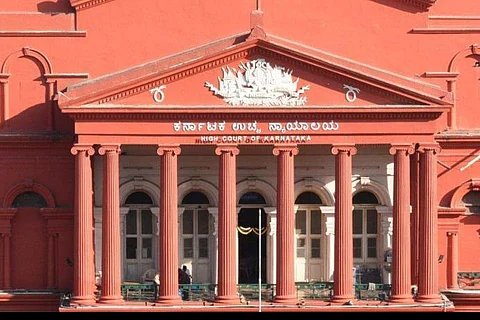

The Karnataka High Court has refused to admit the application filed in the Karnataka High Court against the alleged misuse of the court's interim order that prohibits students from donning religious items such as hijabs and saffron shawls. The three-judge bench comprising Chief Justice of the High Court, Ritu Raj Awasthi, Justice Krishna S Dixit and Justice JM Khazi said that the affidavit filed by Advocate Mohammed Tahir is invalid because a counsel cannot swear to the affidavit in place of the petitioners. The petitioners in this case are girl students in a Pre-Univerisity College in Udupi, who have been barred from entering their college unless they remove their hijab.
The counsel alleged that the interim order applied only to the institution in Udupi, but was being misused by institutions across the country, where not just students, but also teachers were being forced to remove their hijab. The counsel said that these instances were humiliating and insulting to the young Muslim students and women teachers.
The hearing in the case of petitions filed against the Karnataka government and educational institutions barring girl students in hijabs from attending classes has been adjourned for yet another day, to February 16, 2022. Today, the court once again heard submissions by Senior Advocate Devadutt Kamat, who argued that the practice of wearing a headscarf is innocuous and brought to the court's notice similar cases in South Africa, India and Turkey to make his point.
"The essence of Article 25 is that it protects the identity of faith, but not that of jingoism," he added, citing the instances of Hindutva-influenced students turning up in saffron shawls to protest against Muslim students wearing a hijab.
The advocate referred to a case of a Hindu girl who was banned from wearing a nose ring in a school in South Africa. The South African court was asked if "heavens would fall if she didn't wear the nose ring for a few hours in school," which Kamat said was similar to the statements being made in the case of the Muslim girl students. He added that the South African court, in its judgment in favour of the Hindu girl, said, "The admirable purposes that uniforms serve do not seem to be undermined by granting religious and cultural exemptions." The court also added that diversity in this matter, with more students expressing varied religious cultures, is not a thing to be feared, but a thing to be celebrated.
Kamat also brought up the court's interim order and said that the Bench probably forbade any students from donning religious items of clothing with secularism in mind. However, the advocate noted that India's secularism is positive in nature, giving its citizens the opportunity to express their religious beliefs.
Urging the court to suspend the interim order, Kamat said that it suspends fundamental rights. "I respectfully submit that the sweep of your lordship's order is extremely broad and it is in the teeth of Article 25 and other rights. Kindly make some leeway. In the meanwhile, permit us to wear the headscarf in addition to the regular uniform. Consideration will take time," he submitted.
The application that was submitted earlier and Kamat's statement come in light of instances all over the state of Karnataka where Muslim teachers and students were being asked to remove their hijab and burkha in front of the gates of educational institutions before entering.
